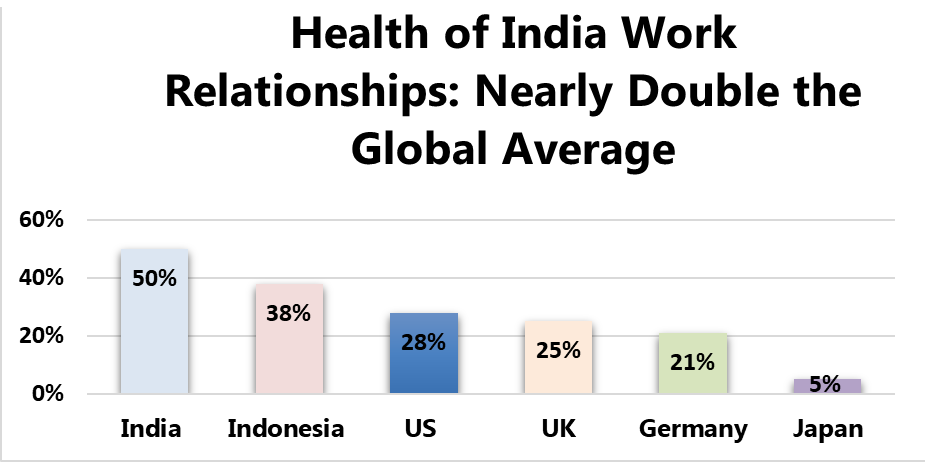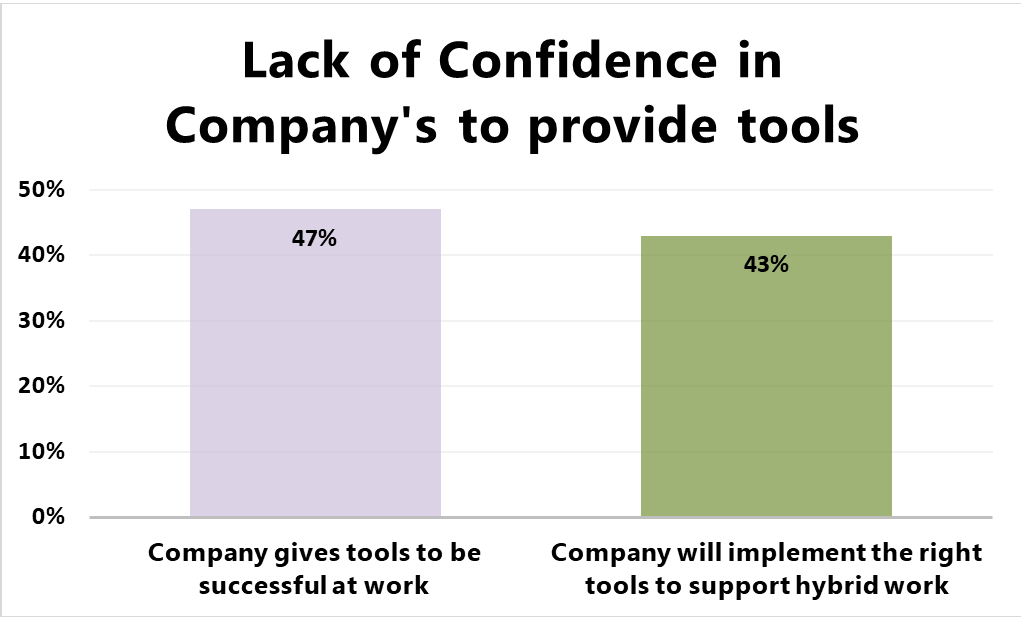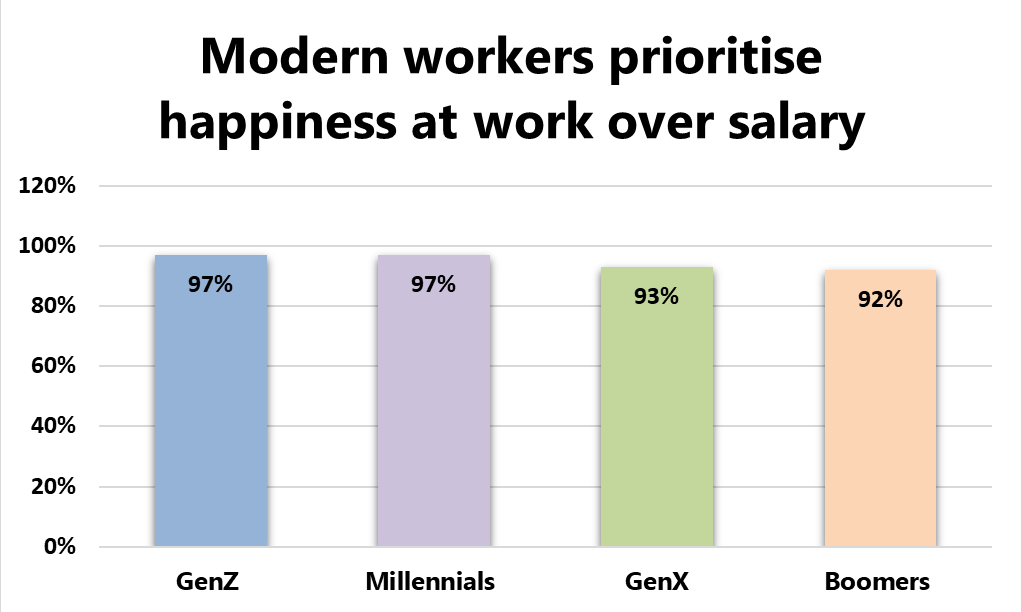Indian workforce is okay with earning less to be happy : Study identifies key drivers
India's knowledge workers are leading the way in work satisfaction, with 50% reporting a positive work relationship—almost twice the global average of 27%.

Indian workforce are okay to earn less to be happy. Study identifies key drivers that confirmed by 83% respondents.
In India, the country of diversity in culture, creed and people at person and corporate, are likely to be more happy than earn more revealed by the HP Work Relationship Index 2023.
When compared to their global counterparts, Indian employees are the most satisfied at work. In contrast to the worldwide workforce, where just 27% describe a favorable work connection, 50% of Indian knowledge workers express a great sense of satisfaction in their occupations.
HP Inc. has released revolutionary findings from its first HP Work Relationship Index, a comprehensive study that examines employees’ connections with work all across the world. 83% of knowledge workers are willing to work for less money or to be happier.

“There is a huge opportunity to strengthen the world’s relationship with work in ways that are both good for people and good for business,” said HP Inc. President and CEO Enrique Lores.
“As leaders, we must always reject the false dichotomy of productivity versus happiness.” The most successful businesses are built on cultures that allow individuals to perform in their jobs while also flourishing outside of work.”
The study looked at 50+ facets of people’s connections with work, such as the role of work in their life, their skills, abilities, tools, and workplaces, and their leadership expectations.
The survey also looked at how work affects employee well-being, productivity, engagement, and culture.
HP established its Work connection Index as a result of this, which is a measure of the world’s connection with work that can be followed through time. It discovered that just 27% of knowledge workers currently have a positive relationship with their jobs; more information on the Index can be found here.
Employees’ mental, emotional, and physical well-being are being harmed by unhealthy work relationships.
HP conducted this groundbreaking study with corporate leaders, IT decision-makers, and knowledge workers to get insights into the variables that promote meaningful, productive, and purposeful work experiences.
The findings highlight the harmful effects of an unhealthy work relationship on an employee’s life and an employer’s business.
When employees are dissatisfied with their working relationships, the business suffers:
- Morale and Engagement: Knowledge workers report lower productivity (34%), higher job disengagement (39%), and higher emotions of detachment (38%).
- Retention: Even when employees are ambivalent about their job, more than 71% are considering leaving the organization. When they are really dissatisfied, that figure climbs to 91%.
Unhealthy work connections can have a negative impact on employees’ well-being:
- Mental: More than half of these employees (55%) suffer with self-worth and mental well-being, citing low self-esteem and a sense of failure.
- Emotional: These concerns inevitably have an impact on other aspects of their lives, with 45% stating that their personal connections with friends and family suffer, and more than half (59%) stating that they are too exhausted to pursue their personal passions.
- Physical: Mental and emotional well-being can make physical well-being more difficult to sustain. 62% of employees report difficulty maintaining a healthy diet, working out, and getting enough sleep.
Identifying the Motivators Behind a Positive Work Relationship
According to approximately 60% of respondents, employees’ work expectations have altered dramatically in the last two to three years. Fifty-seven percent of those polled said they have higher expectations of how they would be treated at work.
The study looked at more than 50 aspects that contribute to a positive work-life balance, establishing six main drivers that represent crucial focus areas – and major imperatives – for business leaders, and compose the index that will be followed throughout time.
- Fulfillment: Employees aspire for purpose, empowerment, and a meaningful connection to their work, but just 29% of knowledge workers routinely experience these characteristics. Businesses must prioritize employee fulfillment through enhanced voice and agency in order to adapt to changing worker expectations.
- Leadership: According to 68% of company executives, new ways of working necessitate new leadership styles; nevertheless, just one in every five workers believes leaders have developed their leadership styles adequately. Emotional intelligence and honest, compassionate leadership are essential in today’s business.
- People-centricity: Only 25% of knowledge workers routinely receive the respect and value they believe they deserve, and even fewer have the flexibility, autonomy, and work-life balance that they desire. To solve this, leaders must emphasize the importance of putting people first and putting their teams at the heart of decision-making.
- Skills: While 70% of knowledge workers favor excellent leadership and technical skills, just 31% are regularly confident in either. ‘Best-practice’ organizations can gain a competitive advantage in skill development and employee engagement by investing in comprehensive training and support.
- Tools: Today’s workers desire a say in the technology and tools provided by their employers, as well as for such technology to be inclusive. However, only 25% of businesses are confident that the proper tools will be implemented to facilitate hybrid work. The technology portfolio is no longer just a utility; it is also becoming a significant driver of employee engagement, connectivity, and enablement.
- Workspace: Knowledge workers desire a consistent experience when they move between work sites, as well as the ability to choose where they work each day. Effective hybrid workplaces, simple transitions, flexibility, and autonomy will be critical in instilling trust among employees and establishing a healthy work environment.

Trust and an emotional connection are now essential in attracting and retaining employees.
According to the Work Relationship Index, now is a critical time to reinvent the world’s relationships with work. Greater workplace trust and emotional connection were recurring themes across the six fundamental drives.
Almost three-quarters of company leaders agree that emotionally aware leadership is the only way to be successful in the future.
Significantly, the survey discovered that emotional intelligence – as well as greater trust and agency – hold significant weight with employees: 83% are willing to work for less money to find an employer who appreciates these traits.
- Strong workplace culture: Knowledge workers are willing to take an 11% wage loss to work for a company that has empathic, emotionally savvy leadership and above-average employee engagement and fulfillment.
- Flexibility: The same group would forego 13% of their compensation to work somewhere that allows them to work when and when they desire.
The study, which polled over 15,600 people from various industries in 12 countries, found that the world’s relationship with work has reached a tipping point, with far-reaching consequences.
Value our content… contribute towards our growth. Even a small contribution a month would be of great help to us. Since our establishment, we have been serving the industry through daily news and updates.
Our content is free for all, and we plan to keep it that way.
Support People Manager. Pay Here (All it takes is a minute)
- Pernod Ricard India introduces Cheers VRorld, an industry-first VR-powered onboarding experience in the Alco-Bev sector - February 11, 2026
- Jio-bp Appoints Sareeta Bhatikar as Chief Human Resources Officer to Steer Next Phase of Growth - February 11, 2026
- India Keeps Hiring as Global Markets Slow: Michael Page India Salary Report-26 - February 6, 2026










